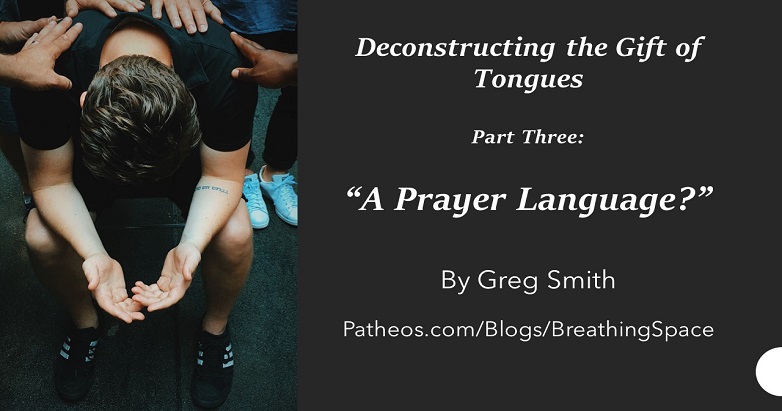Many people call the gift of tongues their Prayer Language. This assumes that it is an actual language. Is there anything linguistic about the gift of tongues?

Sermons at Pentecost often identify the Acts 2 event as God’s miraculous reversal of the incident in Genesis 11. They claim that thousands of years after God confused human speech at Babel, God unified people’s language through the gift of tongues at Pentecost. The problem with this interpretation is twofold: First, the Genesis account is ahistorical and mythological in nature. Second, the tongues speaking at Pentecost didn’t clarify anything. In fact, it made the disciples seem drunk (Acts 2.13)!
The miracle of evangelistic clarity at Pentecost wasn’t the gift of tongues, but the fact that people of different nationalities heard the message in their own language. Tongues wasn’t a reversal of Babel. Supernatural hearing, however, was exactly the reversal of Babel’s confusion that the people needed so they could understand the gospel message.
A Heavenly Language?
Some people call tongues a heavenly language. They get this from Paul’s words in 1 Corinthians 13.1, “If I speak in the tongues of humans and of angels but do not have love, I am a noisy gong or a clanging cymbal.” Certainly, if you listen to tongues-speakers, you can discern the rise and fall of vocal inflection, and the cadence of phrases. But if you listen to enough different people speaking tongues, you’ll also catch on to the fact that glossolalia sounds different coming from different people. So different, in fact, that it couldn’t be considered a single language, heavenly or otherwise.
An Earthly Language?
As a linguist who has studied Latin, Greek, and Spanish, I have a pretty good handle on what a language sounds like. Tongues isn’t it. Languages have a far more sophisticated vocabulary than tongues. Tongues is a jumble of repeated syllables and sounds, often with so much repetition that it’s obvious that a person isn’t speaking a language. A good tongues-speaker will have developed a large repertoire, but that doesn’t make it a language.
Tongues-speakers borrow from other languages. In fact, you’ll find that if a tongues-speaker has been exposed to other languages (but doesn’t speak them), then their tongues will bear the mark of those foreign languages. Not in terms of vocabulary, but in the sounds they make. In other words, your particular tongues will sound like other languages to which you’ve been exposed. If like me, you’ve studied other languages, you may find those sounds and syllables sneaking into your tongues-speaking.
If Not a Language, What Is It?
Based on linguistics, I’m not convinced that tongues-speaking is a language at all. In fact, rather than a reversal of Babel, I’m convinced that it is babble. In the first article of this series, I told how one friend said it starts like baby talk, which is an apt description. A baby doesn’t know the words they’re using—but they may know what they’re trying to communicate. If they’re hungry, they may communicate this with “gooble-goo,” which doesn’t make any linguistic sense. But it still expresses their hunger. The fact that it’s babble doesn’t make tongues meaningless. Even though it’s not exactly a “prayer language,” it can be a useful mindset to go into, during times of intense prayer. Its meaning isn’t in its linguistic properties, but its spiritual significance.
This is why Paul talks about interpreting tongues, rather than translating. There are no linguistics to translate—but that doesn’t mean this expression of prayer and faith is meaningless. God knows what the praying person means, and the person having the experience may even have a sense of it, even if they can’t put it into words. When the hungry baby says “gooble-goo,” their words make no sense, but the mother, from experience and intuition, fully understands what her child intends. So, it is with the Holy Spirit. Paul says in Romans 8.26-27:
“Likewise the Spirit helps us in our weakness, for we do not know how to pray as we ought, but that very Spirit intercedes with groanings too deep for words. And God, who searches hearts, knows what is the mind of the Spirit, because the Spirit intercedes for the saints according to the will of God.”
A Warning About Tongues
Once, I saw a video recorded by anthropologists who were observing glossolalia at Pentecostal meetings. Adults in the congregation were jumping, thrashing, raising their hands, and shouting in tongues. A small child wandered among the adults, pulling at ladies’ skirts and men’s trousers, trying to get someone’s notice to no avail. The camera zoomed in on the child who stood still for a moment with an index finger to pursed lips, deep in consideration.
Suddenly, the child began to flail and twitch. One or two adults turned their gaze to him. When he saw that he was gaining an audience, he thrashed some more, then cried out in a string of unintelligible syllables. Every eye was on him as he evidenced the baptism of the Holy Spirit, with the initial evidence of speaking in tongues. At least, that’s what it looked like. But the camera showed it was a ploy for attention.
When churches and denominations place their priority on such outward displays of ecstatic experience, this is bound to happen. Add a doctrine that says you have reached a higher level of Christianity once you have gained this Second Blessing, and you’ve created a situation ripe for spiritual abuse. People feel pressured to perform because nobody wants to be at the bottom of a supernatural hierarchy. Some fake it, with full knowledge that this is what they’re doing. Others manufacture the experience and even believe it themselves because they don’t want to be looked down upon or left out. When the gift of tongues is used as a measuring stick for supposed spiritual maturity, it can be weaponized against others who do not practice this spiritual gift.
Getting Beyond Language
For those who truly practice the gift of tongues (and don’t fake it), the experience can bring a person closer to God. They feel an intimacy and divine union that makes their prayer life come alive. This is because, through tongues, prayer moves beyond language into a realm of understanding and knowing God heart-to-heart. But tongues-speaking isn’t the only way to move beyond language, into more meaningful prayer. There’s another way, that everybody can do, without waiting on a special move of the Holy Spirit, tongues of fire, or anything else.
Contemplative Prayer
If you want an intimate way to pray that goes beyond the confines of language, there’s a type of prayer that avoids the pitfalls of tongues. The practice of contemplative prayer emerges from an ancient tradition of Christian meditation that goes back to the third-century desert monks. While tongues are all about talking to God, contemplative prayer is about listening to God and soaking in God’s love.
The advantage of contemplative prayer is that it thrives on love rather than ecstasy. It never creates a hierarchy. It has no potential to turn you into a “noisy gong or a clanging cymbal.” In fact, it could be said that contemplative prayer “is patient;…kind;…not envious or boastful or arrogant or rude. It does not insist on its own way.”
Paul equates tongues and prophecy with a less mature faith than simple love. In 1 Corinthians 13.8-10 NRSVUE, Paul writes:
Love never ends. But as for prophecies, they will come to an end; as for tongues, they will cease; as for knowledge, it will come to an end. For we know only in part, and we prophesy only in part, but when the complete comes, the partial will come to an end.
Contemplative prayer, based on the quiet experience of God’s love, touches the “complete” that Paul predicts will come. Perhaps this is close to what he meant when he said, “…Strive for the greater gifts. And I will show you a still more excellent way.” That was at the end of chapter 12. The very next verse, 1 Corinthians 13.1, is about tongues being eclipsed by love. Words, whether heavenly or earthly, can be divisive. They can be misunderstood. But silence soaked in love is a more excellent way. Silence needs no interpretation. It is holy and whole. Contemplative prayer is simply sitting in silence in the presence of God’s love. This love stops all mouths and silences all tongues. Whether you’ve ever experienced the gift of tongues or not, I invite you to try contemplative prayer, which definitely is a more excellent way.
*Scripture quotations are from the NRSVUE.












